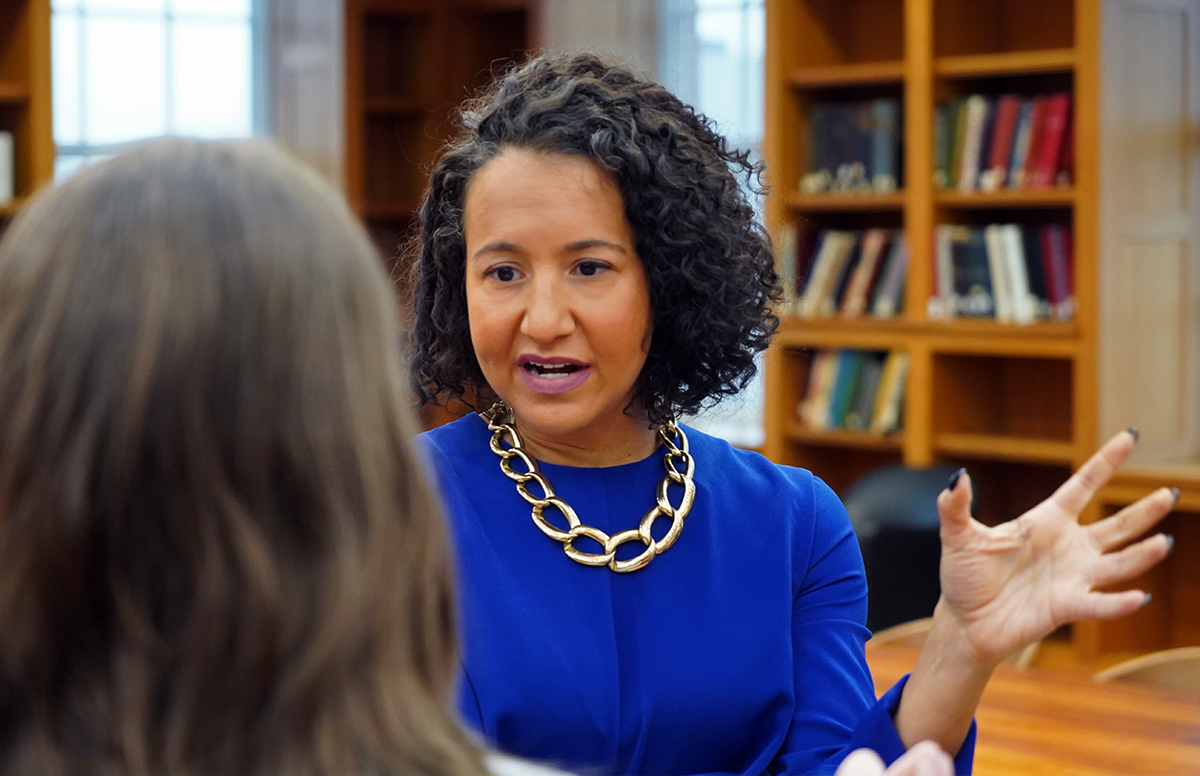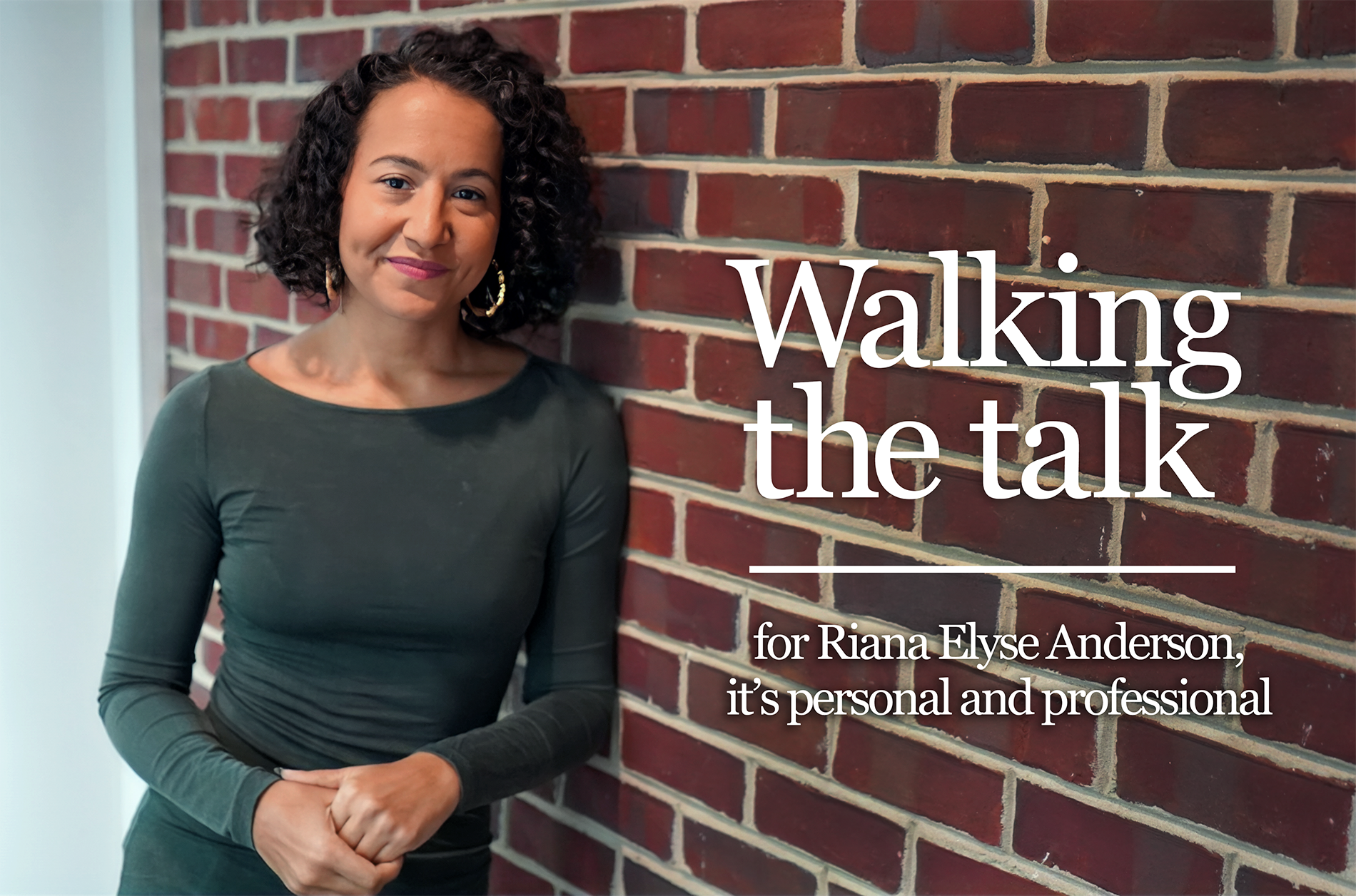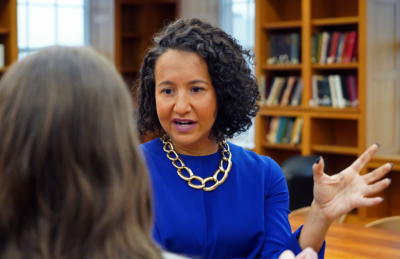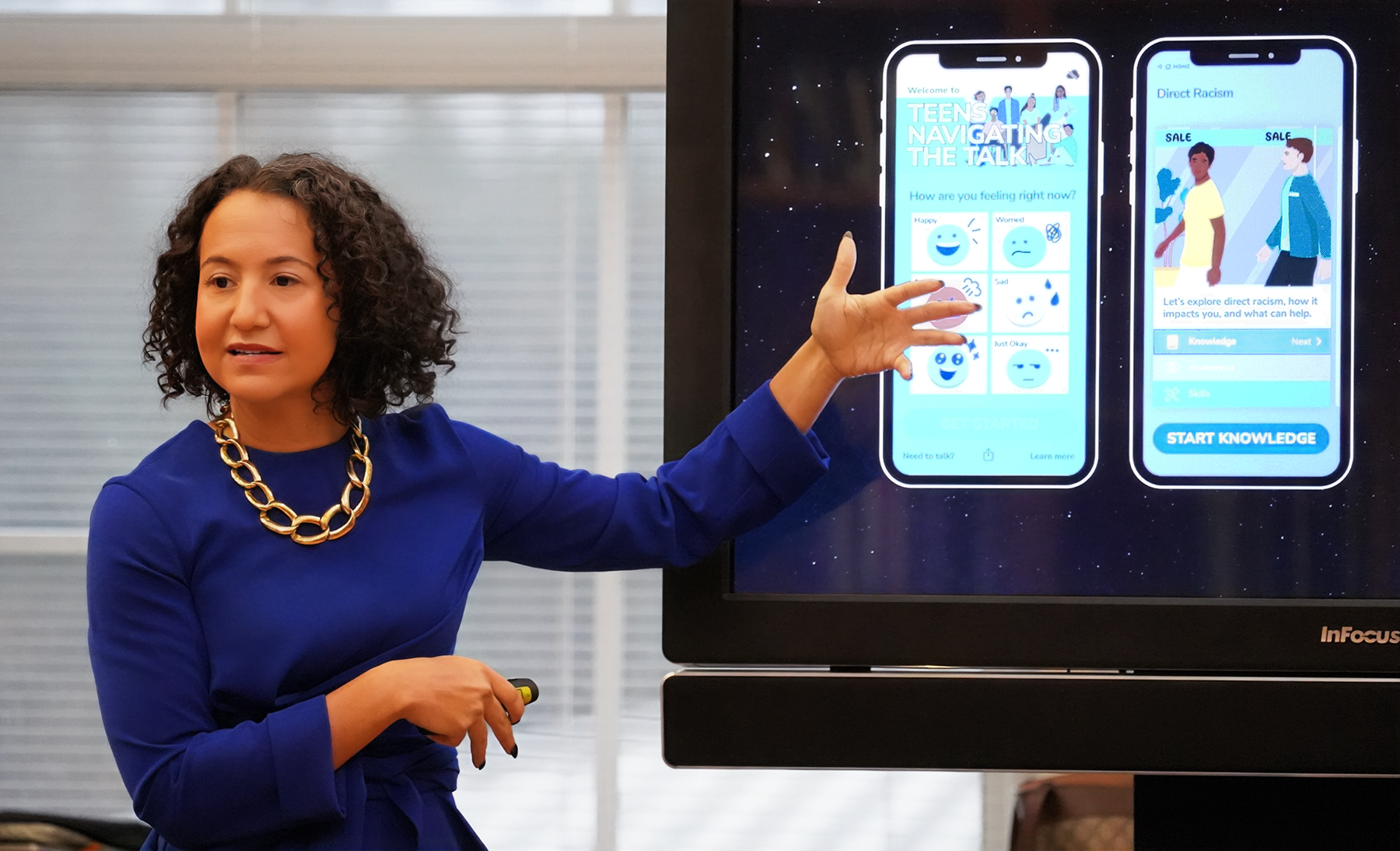Riana Anderson


Walking the talk: for Riana Elyse Anderson, it’s personal and professional

For Riana Elyse Anderson, it’s personal and professional
Ask a White parent if they have had “the talk” with their children, and they would likely assume you are referring to a talk about sex. Ask the same question to a Black parent, and they might ask you to clarify which talk you mean. The other talk, and one they may give more often, is about living in a racialized society. Handling racism. Being safe. Being successful. Being proud to be who you are.
It’s the talk that Riana Elyse Anderson, Ph.D., is trying to help parents have more effectively by infusing it with strategies informed by science.
But not only is Dr. Anderson putting research and interventions into “the talk,” she is also insisting that scholars, government, and communities put action behind platitudes. All must do something to ensure the mental and physical health equity of Black youth, and she’s investing her career and herself into walking the talk.
Her scholarly work to support parents and youth in this challenge began with her dissertation work at the University of Virginia and became more focused during a postdoc at the University of Pennsylvania. There, along with her postdoc mentor Dr. Howard Stevenson and an interdisciplinary team of students, she developed a program to help Black families talk about racism with a therapist. Their research contributed to a significant literature showing that “the more families are able to talk with each other about race and racism, the better the outcomes for these young people,” she said.
But that was only the most recent impetus for this work. The roots of her commitment to this idea of preparing Black youth for the world they live in began in her own childhood.
A lifetime of “the talk”
As an inquisitive child, Anderson asked a lot of questions. Her family and community members often suggested a book or other resources to learn more. They explained the Civil Rights Movement and other events related to justice. Her mother constantly provided a model of cultural pride. “Every time I walked in my house,” she says of her mother’s “Afrocentric” collection of art, books, and more, “there was a knowledge of this is who you are.”
So for her, there was not a single talk that her mother or anyone had with her about growing up Black. Instead, there was a lifetime of discussion, references, and a general environment that affirmed her identity and pride as a Black American.
But the implications of that messaging were confounded by what she saw around her.
Ask a White parent if they have had “the talk” with their children, and they would likely assume you are referring to a talk about sex. Ask the same question to a Black parent, and they might ask you to clarify which talk you mean. The other talk, and one they may give more often, is about living in a racialized society. Handling racism. Being safe. Being successful. Being proud to be who you are.
It’s the talk that Riana Elyse Anderson, Ph.D., is trying to help parents have more effectively by infusing it with strategies informed by science.
But not only is Dr. Anderson putting research and interventions into “the talk,” she is also insisting that scholars, government, and communities put action behind platitudes. All must do something to ensure the mental and physical health equity of Black youth, and she’s investing her career and herself into walking the talk.
Her scholarly work to support parents and youth in this challenge began with her dissertation work at the University of Virginia and became more focused during a postdoc at the University of Pennsylvania. There, along with her postdoc mentor Dr. Howard Stevenson and an interdisciplinary team of students, she developed a program to help Black families talk about racism with a therapist. Their research contributed to a significant literature showing that “the more families are able to talk with each other about race and racism, the better the outcomes for these young people,” she said.
But that was only the most recent impetus for this work. The roots of her commitment to this idea of preparing Black youth for the world they live in began in her own childhood.
A lifetime of “the talk”
As an inquisitive child, Anderson asked a lot of questions. Her family and community members often suggested a book or other resources to learn more. They explained the Civil Rights Movement and other events related to justice. Her mother constantly provided a model of cultural pride. “Every time I walked in my house,” she says of her mother’s “Afrocentric” collection of art, books, and more, “there was a knowledge of this is who you are.”
So for her, there was not a single talk that her mother or anyone had with her about growing up Black. Instead, there was a lifetime of discussion, references, and a general environment that affirmed her identity and pride as a Black American.
But the implications of that messaging were confounded by what she saw around her.
Two different worlds
Born to a Black mother and a Greek father in Detroit, she spent her entire youth in two different worlds. She lived with her mother and spent much of her time with her maternal grandparents and extended family in the Black neighborhoods of the city (Detroit was about 80% Black at the time) but would go outside the city limits with her father.
From an early age she noticed that something was very different about these two worlds. The streets looked nicer and felt safer when traveling with her father in the suburbs, and she noticed that she was treated differently by people they encountered compared to her mother’s family.
After being with both her mother’s and father’s families on holidays, she realized she was, “hearing these two wildly different conversations and ways of being.” She began to recognize the impact of race and culture from an early age from these observations.
Seeking justice
Out of these experiences came a drive to seek what is right and what moves people forward. “Justice is the theme that is cooked all the way through” her life, she said. “Helping people seek justice and be protected,” more specifically.
One of her earliest memories of questioning fairness came when she was only about 7 years old. The Michigan governor had closed psychiatric facilities in the state citing corruption and abuse. But that left her wondering if all those people would be turned out onto the streets where she had seen for herself how difficult life is for those who are unhoused. It seemed unfair and unjust.
In second grade, she tested into a school for gifted children where the curriculum and fellow students helped her excel. By high school, she began interacting with students in private schools. At an education conference for Black students one year, she took on some of those friends in a debate. She argued that the funding and quality of education they received was so different from her public school that the effect was unjust. “I wasn’t coming for you,” she told them later, “But facts like these are facts.”
It foreshadowed the career to come as she uses evidence to drive home the necessity of intervening for Black youth.

Learning to see things systemically
After graduating from the University of Michigan with a degree in psychology and political science and on a pre-med track (with pediatric psychiatry in mind), recruiters at Teach for America pursued her asking if she wanted to teach in an inner-city school for two years. She really did not, but it sounded “like the right thing to do,” she concluded. She signed up and was sent to an elementary school in west Atlanta. “That was the most education I’ve ever received in my life,” she said.
Even when a week ended on a good note, students often came back to school on Monday seemingly having lost ground behaviorally and academically. The family, school, and community resources were inadequate to overcome inequalities that led to what she saw. “It’s so deeply unfair to kids who have no hand in that unfairness,” she concluded.
It was a tough two years, and for the first time in her life, she faced a situation where she couldn’t excel. But it led to an important insight. “If the brightest and best among us are failing miserably to get through in these situations,” she observed, “how do you actually change education in America?”
The experience confirmed her thoughts from college that sustained change and improvement had to come on a broader, more systemic level because her students were not just students. They lived in families embedded in a community that were embedded in a city, state, and country.
“We need a neighborhood, a school, a family, a city government, all of these things to work in lockstep, to really get at the changes that we want,” she said. While her first desire was to help individuals, she now had a clearer vision that to make a difference, she needed to work on wider systemic and multi-disciplinary interventions. Further education was needed.
The path to scholarship and interventions
Before starting her Ph.D. at the University of Virginia in Clinical and Community Psychology, she spent a year at Johns Hopkins University getting her feet wet in research by helping the majority-White adolescent psychiatry department understand why their parenting programs were not being used in the Black community.
Then there was a predoctoral internship at the Yale School of Medicine; a postdoc at the University of Pennsylvania; faculty appointments at the University of Southern California and the University of Michigan; two yearlong residential fellowships at Stanford University and Harvard; and now an associate professor position at Columbia University in the School of Social Work.
In the 10 years since receiving her Ph.D., Dr. Anderson has been busy investigating the competencies needed for successful racial socialization but has also been working hard to develop interventions to disrupt the negative impact of discrimination. “Applied interventions and translation is really my happy place,” she said.
During her postdoc at Penn, she and students developed a program for youth and families called EMBRace (Engaging, Managing, and Bonding through Race) designed to help families with “the talk.” Later, during the pandemic, Anderson and her colleagues began to wonder, “how do we support young people’s psychological well-being with discrimination during these times?” The answer seemed somewhat obvious. Kids are on their phones all the time; so, they built a company (Research and Clinical Empowerment [RACE] Space, Inc.] and developed an app.

While evaluating and refining the app continues, Anderson also continues her scholarship in understanding and developing coping strategies for Black youth and repairing the damage from the past. “If our empirical work demonstrates that it is important,” she said in a talk at UGA, “we cannot be silent. And even though we are in a “very hostile climate” for this kind of work, she said, “I never want to be on the side of being too afraid to say something that is true.” She is indeed walking the talk.
Story and photos by David Pollock.
More about Riana Elyse Anderson
The EMBRace program: https://www.theembraceprogram.com/
Faculty page: https://socialwork.columbia.edu/directory/riana-elyse-anderson
Personal site: https://www.rianaelyse.com/
